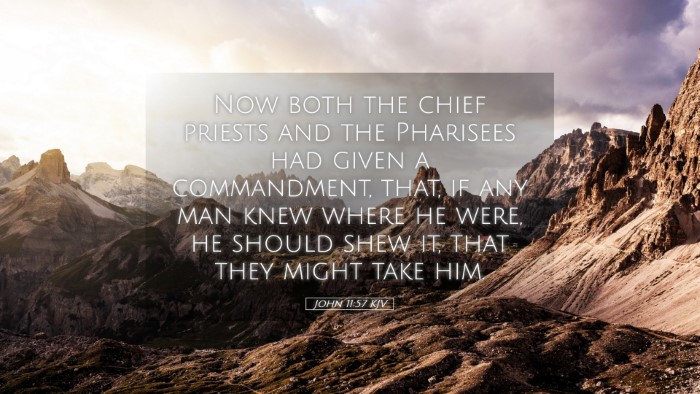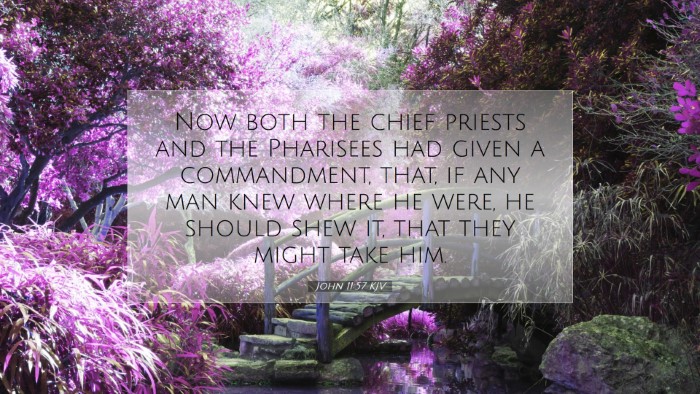Commentary on John 11:57
John 11:57 states: "Now both the chief priests and the Pharisees had given a commandment, that, if any man knew where he were, he should show it, that they might take him." This verse signifies a pivotal moment in the Gospel of John, as it captures the escalating tension between Jesus and the Jewish authorities. In this commentary, we will explore the insights from prominent public domain scholars such as Matthew Henry, Albert Barnes, and Adam Clarke to deepen our understanding of this passage.
Contextual Analysis
The background leading to John 11:57 is crucial for understanding the significance of this verse. This moment occurs after the miraculous raising of Lazarus, which not only demonstrates Jesus' divine authority but also incites fear and jealousy among the religious leaders (John 11:45-53). The raising of Lazarus was the final public miracle that demonstrated Jesus' power over death, solidifying His claim to the Messiahship in the eyes of many while threatening the established authority.
Matthew Henry's Insights
According to Matthew Henry, this verse showcases the growing animosity and hostility towards Jesus among the religious elite. Henry highlights that the chief priests and Pharisees were motivated by fear, particularly fearing loss of their influence and power over the people. He emphasizes how they perceived Jesus as a direct threat to their established system, leading them to take extreme measures against Him.
Albert Barnes' Interpretation
Albert Barnes elaborates on the commandment issued by the chief priests and Pharisees, considering it a desperate attempt to maintain control over the populace. Barnes indicates that this command is indicative of a broader theme of resistance against divine authority, where human institutions prioritize their preservation over the truth of God’s revelation through Christ. Barnes also notes that the fierce resolve of these leaders only intensifies the momentum towards the crucifixion.
Adam Clarke's Observations
Adam Clarke further reflects on this verse by analyzing the socio-political ramifications it carried. Clarke suggests that the command to apprehend Jesus reveals the tyranny of the religious leaders, illustrating their willingness to use fear and intimidation as tools to exert influence. Clarke perceives this as a microcosm of the spiritual blindness that pervades the Jewish leadership, rendering them antagonistic to the very thing that could lead to their salvation.
Theological Implications
John 11:57 serves as a vital reflection on the nature of authority and the human response to divine revelation. The tension depicted in this verse invites readers to consider the lengths to which people might go to preserve their own power in the face of God’s operating will. The refusal of the Jewish leaders to accept Jesus' miracles and teachings highlights a profound truth about human nature—when confronted with divine truth, individuals and institutions often choose self-preservation over acknowledgment of God’s authority.
Lessons for Pastors and Theologians
-
Confronting Authority: This passage reminds spiritual leaders to remain vigilant against the allure of worldly power that can seduce even those who are meant to shepherd God's people. It challenges them to prioritize God’s truth above personal or institutional interests.
-
The Role of Fear: Understanding the role fear plays in decision-making within church leadership is critical. It can lead to actions that seem justified but ultimately oppose God’s will.
-
Recognition of Divine Authority: The need for pastors, students, and scholars alike to recognize and submit to the authority of Christ is paramount. This submission may often conflict with societal or institutional structures.
Application for Students and Scholars
-
Critical Thinking: Students and scholars of theology are encouraged to examine the motivations behind the behaviors of the Pharisees and chief priests in their own studies. Understanding the historical context provides an enriched perspective on human behavior in relation to divine outreach.
-
Exploring Resistance: Engaging with the concept of resistance to divine revelation can lead to fruitful discussions surrounding the contemporary church's challenges. Scholars must take heed of similar dynamics within today’s ecclesiastical structures.
-
Encouraging Faithfulness: The narrative in John 11 calls for rigorous fidelity to Christ’s mission, an essential principle for both academic work and active ministry.
Conclusion
John 11:57 serves as a striking reminder of the conflict between earthly authority and divine sovereignty. The observations made by Matthew Henry, Albert Barnes, and Adam Clarke collectively underscore the urgency for the church today to learn from these events. In a world where fear and power can lead to turbulence and division, the teachings of Christ should guide responses. For those in pastoral roles, academic pursuits, and theological reflections, this passage encourages a steadfast commitment to truth, compassion, and a willingness to confront injustice through the lens of faith.


